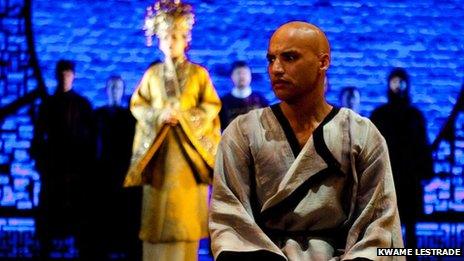The Orphan of Zhao comes to RSC
- Published

The Orphan of Zhao is a centuries-old Chinese play which has been called "the Chinese Hamlet". Now it has become the first Chinese play ever produced by the Royal Shakespeare Company - and the RSC's new artistic director thinks theatre-goers are likely to see more drama from China on stage in Britain.
In China almost everyone knows the story of The Orphan of Zhao, even if they've never actually seen it on stage.
The play was written in about 1300 by Ji Junxiang, though it is based on real-life events which occurred centuries earlier. It is the story of two warring clans: One clan is wiped out by the other except for a single child who survives. The orphan grows up to avenge the destruction of his family.
In China the story has been retold endlessly. Some stage versions are traditional, with so much music they strike westerners as half-way to opera, and some more avant garde. In 2010 the story was the basis for the film Sacrifice, directed by Kaige Chen.
Three centuries ago The Orphan of Zhao became the first Chinese play translated in the west and in 1753 Voltaire wrote an adaptation.
But like most Chinese classics it is now almost unknown to European audiences: Chinese plays have been all but absent from British theatres since the fading of the fashion for "Chinoiserie" in the 19th Century.
The new head of the RSC, Greg Doran, is directing the play at the Swan Theatre in Stratford-upon-Avon in a version by James Fenton. He hopes the production will be followed by other Chinese work and wants the play to stimulate an interest in the Chinese repertoire generally.
"There is a huge, rich seam of Chinese drama and we know almost nothing about it," he says.
"In fact most of the Chinese plays I wanted to read didn't even exist in English translation. Eventually I decided Zhao was a fitting place to start both on its own merits and because it was the first Chinese play Europeans ever read.
"It's basically a revenge story and the way the story is told feels familiar to an audience today. Partly what attracted me is the epic Shakespearean scale. There's a real psychological depth to it and it sits well with the kind of work we do at the RSC."
Universal themes
When casting for the production was announced there was criticism that there aren't more Asian performers, external in it. The RSC pointed out that the same pool of actors has to work across two other plays in the same season, neither of which has a Chinese connection.
But the RSC has since said it recognises that the lack of visibility for Chinese and east Asian actors in the UK is a serious issue and wants to set up a forum for debate of the issue.
Tian Yuan Tan of the School of Oriental and African Studies in London is a specialist in the history of Chinese drama. He says there are qualities to The Orphan of Zhao which have appealed to adaptors and directors outside China.
"When it was originally translated into French it was given the subtitle 'a tragedy' although the whole concept of tragedy was a western one. Historically it didn't mean a lot in the Chinese tradition.
"But the label was useful then - and perhaps still is - because it made people more comfortable with what might otherwise have seemed difficult or obscure. So though the comparison with Shakespeare isn't exact, it may have helped get the play performed in England in the 18th century.
"And the story has universal themes - family, revenge, loyalty and the choices people make. Why do people lay down their lives for others? It's a play about moral choice and that works in all cultures."
Greg Doran made a research trip to Beijing when he was preparing the new production. It made him conscious of a basic cultural imbalance.
"The Chinese are far more likely to have heard of Hamlet than we in the west are to know The Orphan of Zhao," he says.
"How many theatre-literate people here could name a single classic Chinese drama? Very few."
By a neat coincidence the new production opens in Stratford on the day China begins its 18th Party Congress in Beijing. The Congress will choose a new generation of leaders for the world's second biggest economy.
Doran says that just as the West needs to learn more about China, he is sure China is opening up to fresh influences.
"Just by looking at the history of productions of Zhao over the centuries I've learnt so much about Chinese history. And the play is still evolving today, because China is changing so fast."
The Orphan of Zhao is at the Swan Theatre until 28 March 2013.
- Published15 September 2012
- Published7 September 2012
- Published19 August 2011